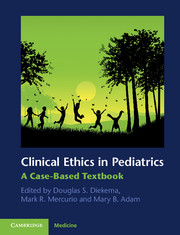Book contents
- Frontmatter
- Contents
- Contributors
- Preface
- Section 1 Core issues in clinical pediatric ethics
- Section 2 Ethical issues at the beginning of life: perinatology and neonatology
- Section 3 When a child dies: ethical issues at the end of life
- Section 4 Ethical issues posed by advances in medical technology and science
- Section 5 Children, public health, and justice
- Section 6 Special topics in pediatric ethics
- 37 Industry representatives, gift-giving, and conflicts of interest
- 38 Patient participation in medical training
- 39 Boundary issues in pediatrics
- 40 The impaired, incompetent, or unethical provider
- 41 Ethics committees and consultation services
- Index
- References
38 - Patient participation in medical training
from Section 6 - Special topics in pediatric ethics
Published online by Cambridge University Press: 07 October 2011
- Frontmatter
- Contents
- Contributors
- Preface
- Section 1 Core issues in clinical pediatric ethics
- Section 2 Ethical issues at the beginning of life: perinatology and neonatology
- Section 3 When a child dies: ethical issues at the end of life
- Section 4 Ethical issues posed by advances in medical technology and science
- Section 5 Children, public health, and justice
- Section 6 Special topics in pediatric ethics
- 37 Industry representatives, gift-giving, and conflicts of interest
- 38 Patient participation in medical training
- 39 Boundary issues in pediatrics
- 40 The impaired, incompetent, or unethical provider
- 41 Ethics committees and consultation services
- Index
- References
Summary
Case narrative
Tracy, a new intern, is on her first rotation in the busy emergency department. Her third patient is an otherwise healthy 23-day-old female infant with a temperature of 101.3ºF. After presenting her history and physical examination findings to her attending physician, she recommends performing a venepuncture, a bladder catheterization, and a lumbar puncture (LP) to obtain specimens for analysis and culture. The attending physician agrees with the plan and asks Tracy whether she is comfortable performing the LP by herself. Tracy observed a number of LPs as a third year medical student, attempted several as a fourth year medical student but does not yet feel proficient. She, however, does not want to seem incapable or to slow her attending physician down. She hesitantly says yes.
After describing the risks, benefits, and alternatives, she obtains consent from the patient’s parents who want to stay in the room. Once the technician has drawn the blood and collected the urine, he helps Tracy set up for the procedure. The gown and mask are hot, and combined with her anxiety, make her begin to sweat. The patient is more vigorous than Tracy had anticipated and the technician is having trouble holding her still to Tracy’s satisfaction. Her first attempt is unsuccessful and, as she asks for a second LP needle, the patient’s father asks Tracy if she has ever done this before. He is concerned that his daughter is experiencing unnecessary pain. Tracy considers how to answer this question, concerned she may lose the opportunity to learn this essential skill.
- Type
- Chapter
- Information
- Clinical Ethics in PediatricsA Case-Based Textbook, pp. 221 - 225Publisher: Cambridge University PressPrint publication year: 2011



